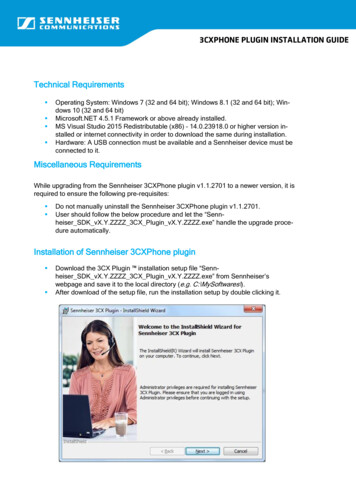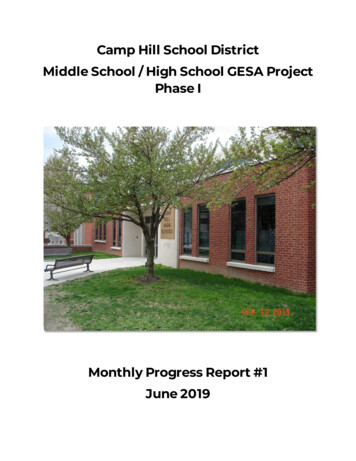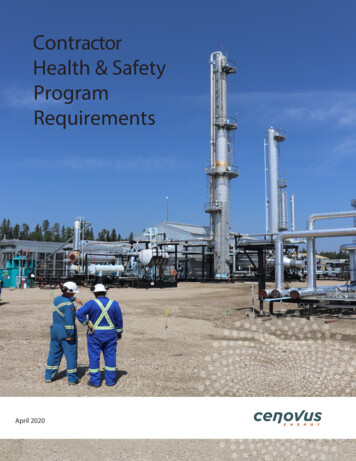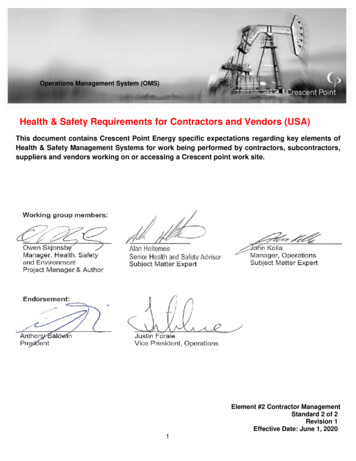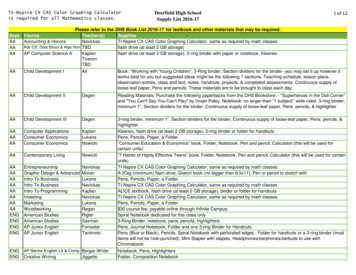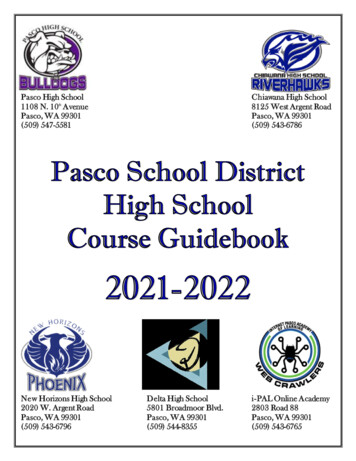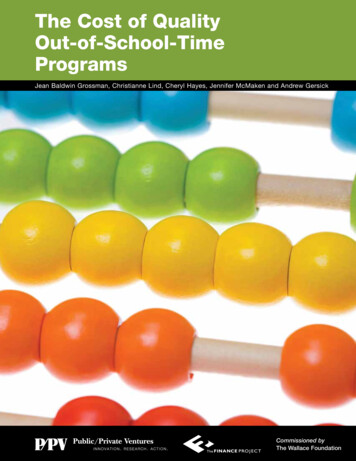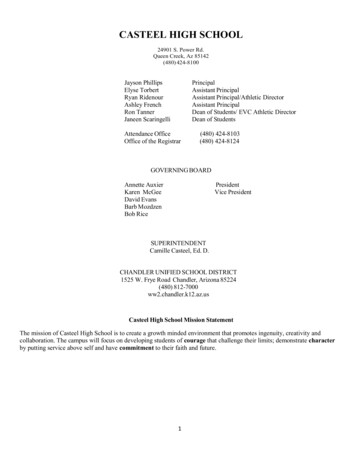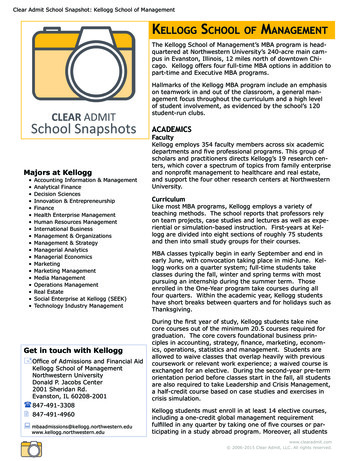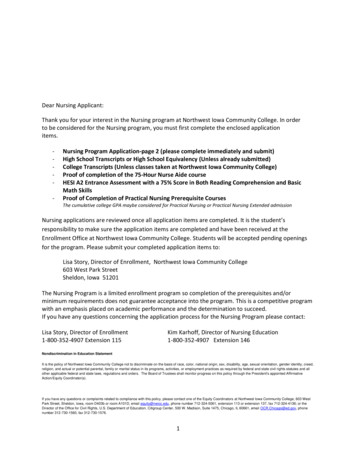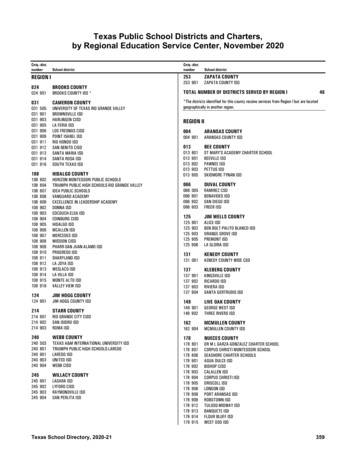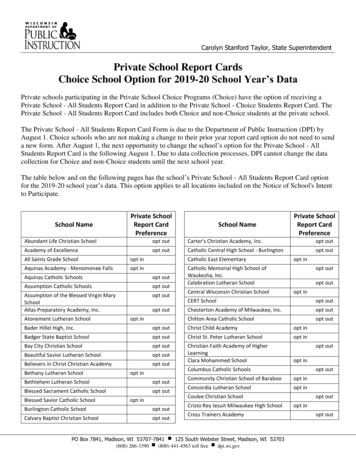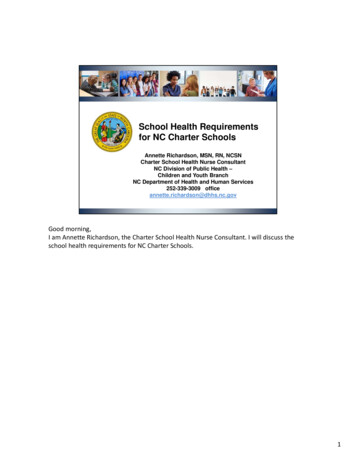
Transcription
School Health Requirementsfor NC Charter SchoolsAnnette Richardson, MSN, RN, NCSNCharter School Health Nurse ConsultantNC Division of Public Health –Children and Youth BranchNC Department of Health and Human Services252-339-3009 officeannette.richardson@dhhs.nc.govNCDHHS, Division of Public Health SH Requirements Charter 20201Good morning,I am Annette Richardson, the Charter School Health Nurse Consultant. I will discuss theschool health requirements for NC Charter Schools.1
7/15/2018NCDHHS, Division of Public Health SH Requirements Charter 20202This is the School Health Nurse Consultant map. There are regional nurse consultants thatcover 6 regions in the state. There is also a chronic disease consultant and of course, acharter consultant. The consultant team provides guidance, technical assistance andprogram monitoring to schools in NC. Although the consultant team is employed by theDivision of Public Health, we provide these services for the NC Department of PublicInstruction and the NC Office of Charter Schools.2
School HealthRequirements for NCCharter SchoolsNCDHHS, Division of Public Health SH Requirements Charter 20203During this presentation, you will be given information to assist you in understanding: Student health requirements for NC Charter Schools Student health recommendations for consideration that are standard in NC publicschools Available resources for assistance in addressing student health issues.3
Communication is KeyEDDIEEducational Directory and Demographical InformationExchange (EDDIE) is the authoritative source for NCpublic school numbers and demographic information. Itis used by multiple NCDPI technology systems.EDDIE is located aphics-and-finances/eddie#go-to-eddieNCDHHS, Division of Public Health SH Requirements Charter 20204LEAs and charter schools are responsible for ensuring that their data in EDDIE is complete,accurate and current. Communication is always through the Office of Charter School’snewsletter. Charter health information is located at the end of the newsletter. Withoutcurrent information in EDDIE you may miss critical communication.4
Communication is KeyOffice of Charter Schools NewsletterStudent Health Officer/Coordinator for each chartershould subscribe to the Office of Charter School’snewsletter. It will have all the most up-to-dateinformation. Anyone may subscribe by clicking SBE/bulletins/211694b and entering their email information atthe top of the page as demonstrated below.NCDHHS, Division of Public Health SH Requirements Charter 20205Anyone may subscribe to receive the newsletter. Enter your email address in the box andyou will begin receiving the weekly newsletter.5
School Health Requirementsfor NC Charter SchoolsNCDHHS, Division of Public Health SH Requirements Charter 20206While charter schools are not subject to many educational requirements, all institutions aresubject to certain health care requirements and to licensing requirements fromprofessional practice boards, as established in NC state statute. Compliance with staffingqualifications helps to ensure safe delivery of care and to limit school liability. The NC Boardof Nursing regulates all nursing and nursing assistant practice through statute‐basedauthority.I am going to review an often‐overwhelming number and variety of health requirements towhich charter schools are subject. The easiest and most consistent way to address all ofthese is to employ a qualified school nurse. We will discuss what a qualified school nurse islater in the presentation.6
School Nursing in NC All institutions are subject to certain healthcare requirements and to licensingrequirements from professional practiceboards, as established in NC state statute. The NC Board of Nursing regulates allnursing (RN, LPN) and nursing assistantpractice through statute-based authority. Appropriate qualifications help to ensuresafe delivery of care and to limit liability.NCDHHS, Division of Public Health SH Requirements Charter 20207The nature of the work in independent settings such as schools (as opposed to a hospital oroffice practice type settings), defines a scope of practice that requires licensure as aRegistered Nurse according to NC Board of Nursing regulations. Licensed Practical Nursesare required to be regularly supervised by Registered Nurses and to have their workassigned to them by a Registered Nurse. Unlicensed assistive personnel is an umbrellaterm used to describe unlicensed health care assistants. Common job titles include Nurses’Aides (NA)/Certified Nursing Assistants (CNA), Patient Care Aides (PCA) /Home HealthAides (HHA)/Patient Care Technicians (PCT), Medical Office Assistants (MOA), MedicalAssistants (MA), Medication Aides (Med Aide), and Medication Technicians (Med Tech). Itis important to understand that the unlicensed assistive personnel may only provide certainclient care tasks as directed by a licensed health care provider ( the RN in the schoolsetting).Licensed Practical Nurses and Unlicensed Assistive Personnel such as a CNA are required tobe regularly supervised by a Registered Nurse and to have their work assigned to them by aRegistered Nurse. As a result, independent LPNs and/or CNAs are working outside of theirregulated scope of practice when employed as a school nurse and risk censure by theBoard of Nursing and liability for the school.7
School Nursing in NC Registered nurse is the only license with ascope to practice independently in theschool setting (not supervised by anotherlicense). Badge law: It is unlawful for any individualto practice or offer to practice as a nurseor use the word “nurse” as a title forhimself/herself or use abbreviations toindicate that he/she is a registered nurseor licensed practical nurse.NCDHHS, Division of Public Health SH Requirements Charter 20208A non‐licensed person representing themselves as the school nurse is operating outside oflegal parameters in NC. According to the Badge Law (G.S. 90‐640 and GS. 90‐171.43) it isunlawful for any individual to practice or offer to practice as a nurse or use the word“nurse” as a title for himself/herself or use abbreviations to indicate that he/she is aRegistered Nurse or Licensed Practical Nurse, unless the person is currently licensed as aRegistered Nurse or Licensed Practical Nurse in North Carolina.Appointment of personnel for the role of a school nurse is a bit different than filling anyother position in either a healthcare or educational setting. Please be mindful of thefollowing: A school nurse must hold a current license as a registered nurse in North Carolina or acompact state. It is a requirement of the agency to ensure each person employed as the school nursemaintains licensure. LPNs may not function independently and should have daily supervision and oversiteperformed by a licensed registered nurse. CNAs may only provide personal care type activities to clients unless delegation ofnursing care activities has been provided by a licensed nurse, registered (RN) andpractical (LPN) that are appropriate to the level of knowledge and skill of the unlicensedperson.Personnel identified as the school nurse on campus but do not hold a license from the8
Board of Nursing should cease using the title school nurse. School Health Coordinator orSchool Health Director are examples of titles that are more appropriate and within legalparameters, although activities should not be those of a nurse.8
Charter School ResponsibilityProtect Health and Safety of StudentsMedical Care to Students by School PersonnelAuthority to provide care: GS 115C-375.1o Law allows school staff to give medical care within areasdescribed when trained to do so by a qualified individualo Allows staff to refuseo Provides limited protection from liabilityNCDHHS, Division of Public Health SH Requirements Charter 20209It is the responsibility for all charter schools to protect the health and safety of all students.Areas of medical care include: Administer any drugs or medication prescribed by a doctor upon written request of theparents Give emergency health care when delay would seriously worsen the physical conditionor endanger the life of the student Perform any other first aid or lifesaving techniques in which the employee has beentrained in a program approved by the State Board of Education.Employees have the right to refuse and no employee shall be required to administer drugsor medication or attend lifesaving techniques programs.Any public‐school employee authorized to provide care under this law will not be liable incivil damages. The exception includes gross negligence and/or intentional wrongdoing.9
School Health RequirementsStudents with Diabetes – Required by Law GS 115C-375.3 Senate Bill 911 Senate Bill 738Ensures that guidelines adopted by the SBEare implemented in schools in whichstudents with diabetes are enrolled.Report on compliance annually by June 1st.NCDHHS, Division of Public Health SH Requirements Charter 202010Each charter school is required under § 115C‐375.3 (SB 911 and SB 738) to provide care forstudents with diabetes in the manner described in statute. Reporting on compliance is done by June1 of each school year.A worksheet is made available in April to assist in gathering your responses.The on‐line report becomes available in May.10
School Health RequirementsRequired components for schools withdiabetic students: Generalized diabetic training for all school staff Two intensively trained school staff for individualstudents with diabetes Written plan for diabetic student careNCDHHS, Division of Public Health SH Requirements Charter 202011The report is based on requirements and it is a part of performance framework A17.Example questions for the report How many students with diabetes were enrolled in your school this past school year?If one or more to #1: Does your LEA offer annual generalized diabetes training to schoolstaff, system‐wide?If one or more to #1: Did your LEA / charter school have at least two persons who wereintensively trained on diabetes care, in any school in which one or more students withdiabetes were enrolled?If one or more to #1: How many students with diabetes, upon notification and parentalrequest, had an Individual Health Plan (IHP) completed by a school nurse or other medicalprofessional in the past school year?Responses are reported to NC DPI Offices of Charter Schools and Healthy Schools.Responses are analyzed to assess and address charter school needs.11
School Health RequirementsResources for schools with one or more students with diabetes:The American Diabetes Association (ADA) Formsfor written care plans and other documents are available ents-andkids/diabetes-care-at-school/ Trainingvideos and power point presentations are also at this sitein addition to being posted on YouTube athttps://www.youtube.com/watch?v ih1NXYx2k9g&feature share&list EC3DE9DDE8EB2A2E56NCDHHS, Division of Public Health SH Requirements Charter 202012These resources will assist the charter school in the care of students with diabetes. TheAmerican Diabetes Association (ADA) provides materials for school use that were also thebasis for creating the North Carolina guidelines required under § 115C‐375.3 (SB 911 andSB 938).The videos cover the required general diabetes information and how to recognize signs ofhigh and low blood sugar. Records of training should be maintained for compliancereporting.In the absence of a school nurse, the medical management plan should be completed bythe student’s health care provider with the input of the parents.The student specific intensively trained school staff persons, the health care provider andthe family form a team in support of the diabetic student in school. The intensively trainedschool staff persons also need individual student care instruction in procedures (such asblood glucose monitoring) and the medical plan. In the absence of a school nurse thattraining may come from the physician’s office or a diabetic educator and is required.12
School Health RequirementsSchool Supply of Epinephrine Auto-Injectors GS 115C-375.2A Provides for the undiagnosed person experiencing an anaphylacticreaction. Directs local boards of education, charter schools and regional schools. Applicable during the school day and at school-sponsored events onschool property.School property does not include transportation to or from school. Requires a minimum of two epinephrine auto-injectors in an unlockedand easily accessible location Requires specific training by statute identified individuals. Specifies planning and response steps. Specifies who can write prescriptions.NCDHHS, Division of Public Health SH Requirements Charter 202013The law states students that have a diagnosis should have their own auto‐injector and thestock epinephrine should not be routinely used.Epinephrine auto‐injectors requires specific training for the persons identified in eachschool. School personnel administering the medication must receive training onadministration and be certified in CPR.The law states there must be a plan in place that details the emergency responseprocedures for use of the epinephrine.And lastly, the law states who can write your prescriptions. Prescriptions must come fromthe Health department, not a physician friend or board member. Many local healthdepartments have the annual training routinely scheduled – you should reach out to themearly to be sure not to miss the opportunity.13
School Health RequirementsReturn to Learn After Concussion-SHLT-001:This educational policy includes guidelines for safe andappropriate return to the educational environment for ALLstudents post-concussion. Policy: ls/policy-legislation General information: 202018.pdf ide.pdf IncludesGuidelines for Implementation, Parent’s Brochure WebinarNCDHHS, Division of Public Health SH Requirements Charter 202014Return‐to‐Learn After ConcussionIn October 2015, the NC State Board of Education adopted a policy to address the learning,emotional, and, behavioral needs of students, pre k‐12th, suffering from a concussion.Although this policy includes student athletes protected under the Gfellar‐WallerConcussion Awareness Act, it is further reaching. Return‐to‐Learn After Concussionincludes requirements for safe return to school for any student in NC public schools whosustains a mild Traumatic Brain Injury (mTBI), more commonly referred to as a concussion.According to the policy the plan must include: guidelines for removal of a student from physical and mental activity when there issuspicion of concussion; a notification procedure to education staff regarding removal from learn or play; expectations regarding annual medical care update from parents, medical careplan/school accommodations in the event of concussion; and delineation of requirements for safe return‐to‐learn or play following concussion.In accordance with the LEA or charter school plan, Each school must appoint a team of people responsible for identifying the return‐to‐14
learn or play needs of a student who has suffered a concussion. Each school must provide information and staff development annually to all teachersand other school personnel. Annual training should include information on concussionand other brain injuries, with a particular focus on return‐to‐learn issues and concerns. Each must include in its annual student health history and emergency medicalinformation update a question related to any head injury/concussion that a studentmay have incurred during the past year.14
Annual Charter School Health Services Report Reports compliance for school health requirements Communicated via Office of Charter SchoolsNewsletter Must meet all the sub-requirements to be reportedas compliant Compliance is reported as part of PerformanceFramework- A-17The school is compliant with all student health and safetyrequirements as defined in general statute, SBE policy, orthe signed charter agreement.NCDHHS, Division of Public Health SH Requirements Charter 202015The worksheet is distributed in April. The online report is open May 1st to June 1st. Thereport closes at midnight June 1st with no exceptions.15
Current Health Lawand Charter SchoolsNCDHHS, Division of Public Health SH Requirements Charter 202016We will take a few moments to discuss additional health laws that apply to NC charterschools.16
Current Health Law and Charter SchoolsImmunizations – Required by LawG.S. 130A-155(c) ALL North Carolina children must be compliant withimmunization law. Principal/headmaster is required to exclude students not incompliance after the 30th calendar day from the first day ofschool. Resources for schools and for cesforschools.htm https://www2a.cdc.gov/nip/kidstuff/newscheduler le/Have a staff person responsible for verifyingimmunizations and reportingNCDHHS, Division of Public Health SH Requirements Charter 202017Each year, all schools are required to report the immunization status of their kindergartenand 7th grade students, according to G.S. 130A‐155(c) and G.S. 130A‐440.Beginning August 2020, there will be a third cohort added and schools will have to reporton the booster dose of meningococcal for all 12th graders who enter the 12th grade afterAugust 1, 2020.A certificate of immunization must be presented for each child on their first day ofattendance. If a certificate of immunization is not presented at that time then, it must bepresented within 30 calendar days.Students records are verified upon new admission, kindergarten enrollment and at entryinto 7th grade and 12th grade.The law outlines 2 exemption categories: Medical and Religious. Philosophical exemptionsdo not exist under NC law.Please note: Although reporting requirements are specific to grades K , 7, and 12, ALL NCchildren must be compliant with immunization law at each grade level.17
Current Health Law and Charter SchoolsHealth Assessment – Required by LawG.S. 130A-440Health Assessment required for all students new toNC public schools within 30 calendar days of achild’s first day of attendance in the public schools.Principal/headmaster shall not permit the child toattend the school until the required healthassessment transmittal form has been presented bytthe 30th calendar day.This action is NOT allowed to impact the student’s academics.NCDHHS, Division of Public Health SH Requirements Charter 202018The intent of this laws is to ensure that all students, not just kindergarteners, have a healthassessment communicate to the school at least once. The wording of the law states thateach student who is presented for the admission into kindergarten or a higher grade in thepublic schools for the first time must “submit proof of a health assessment.”The Health Assessment Transmittal Form is proof of the health assessment and is the onlydocument that may be accepted.This law applies to: Kindergartners: All kindergartners, with the exception of those who have been retained Private and Home Schoolers: if they have never before been enrolled in an NC PublicSchool Out of state transfers: if they have never before been enrolled in an NC Public SchoolsMany schools have added a related question to enrollment paperwork in an effort tosuccessfully identify theses students.The 30-day rule still applies for Health Assessments to be submitted to the principal.Locally, the absence coding will have to be determined.Students are excluded
Jul 15, 2018 · LEAs and charter schools are responsible for ensuring that their data in EDDIE is complete, accurate and current. Communication is always through the Office of Charter School’s newsletter. Charter health inf
